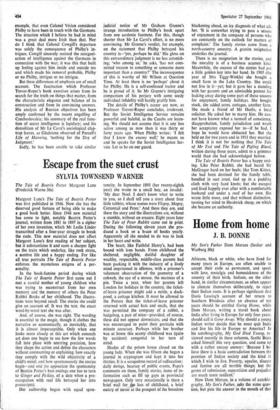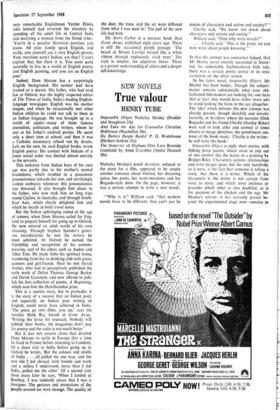Home from home
J. B. DONNE
Africans, black or white, who have lived for many years in Europe, are often unable to accept their exile as permanent, and speak with love, nostalgia and homesickness of the country of their birth. Indians, on the other hand, in similar circumstances, as often appear to alienate themselves deliberately, to reject their Indian roots. It is perhaps significant that Doris Lessing's account of her return to Southern Rhodesia after an absence of ten years should be entitled Going Home, while Dom Moraes, writing a travel book about India after living in Europe for only four years, should call it Gone Away. Why should a young Indian writer decide that he must quit India and live his life 'in Europe or America? In his autobiography, My God Died Young, re- viewed recently in these columns, Sasthi Brata asked himself this very question, and came up with a rather uneasy answer : 'Because I be- lieve there is a basic contradiction between the premises of Indian society and the kind in which I wish to live. Poverty, squalor, disease and famine are all terrible things; but the germs of submission, superstition and prejudice are much more resilient.'
Now Dom Moraes, in a volume of autobio- graphy, My Son's Father, uks the same ques- tion, but puts the answer in the mouth of that
very remarkable Englishman Verrier Elwin, who himself had reversed the situation by spending all his adult life in Central India and marrying a woman from the Gond tribe: 'You're in a peculiar historical position, you know. All your family speak English, and really, you yourself are a very English person. Your reactions aren't Indian, are they? I can't explain that, but there it is. You seem quite naturally to live in a world of English poetry and English painting, and you are an English poet.'
Indeed, Dom Moraes has a surprisingly English background. His mother had been trained as a doctor. His father, who had read law at Oxford, was the highly respected editor of The Times of India, India's leading English- language newspaper. English was his mother tongue, and when he occasionally met other Indian children he could not talk to them in an Indian language. He was brought up in a world of adults—many of them famous journalists, politicians and writers, whom he met at his father's cocktail parties. He spent only a short time at school, and then it was a Catholic missionary school run by Jesuits. Left on his own, he read English books, wrote English poetry. His contact with Indians of a lower social order was limited almost entirely to the servants.
This isolation from Indian boys of his own age was partly due to his mother's mental breakdown, which resulted in a passionate possessiveness towards her son, and terrifyingly violent outbursts whenever this possessiveness was thwarted. It also brought him closer to his father, who now took him on long trips round Ceylon, to Australia, and through South- East Asia, which clearly delighted him and which he recalls in brief travel notes.
But the Indian upbringing ended at the age of sixteen, when Dom Moraes sailed for Eng- land to prepare himself for going up to Oxford. He now entered an adult world of his own choosing. Through Stephen Spender's gener- ous introductions he ' met the writers he most admired. At Oxford he earned the friendship and recognition of his contem- poraries, and of his elders such as Auden and Allen Tate. He made Soho his spiritual home, wandering from bar to drinking club with poets, painters and girl-friends. Here he met David Archer, who had so perceptively published the early work of Dylan Thomas, George Barker and David Gascoyne, and now offered to pub- lish his first collection of poems, A Beginning, which won him the Hawthornden prize.
This is a success story, but in particular it is the story of a success that an Indian poet, and especially an Indian poet writing in English, could never have achieved in India. 'The poets go into films, you see,' says the novelist Mulk Raj Anand in Gone Away. 'Writing the lyrics for musicals. Nobody will publish their books, the magazines don't pay for poetry and the radio is not much better.'
But it was not success alone that decided Dom Moraes to settle in Europe (for a time he lived in France before returning to London).
Of a short visit to India before going up to Oxford he writes, 'But the colours and smells of India . . . all pulled me one way, and the new life I led abroad, with friends and work and a milieu I understood, more than I did India, pulled me the other.' Of a second visit three years later he says, 'When I landed at Bombay, I was suddenly aware that I was a foreigner. The gestures and intonations of -the people around me were strange. The quality of the dust, the trees, and the air were different ' from what I was used to.' The pull of the new life had won.
My Son's Father is a maturer book than Gone Away, published eight years ago. There is still the occasional purple passage. 'The beach at Mount Lavinia twined like a white ribbon through explosively vivid trees.' The style is simpler, the adjectives fewer. There is a greater understanding of others and a deeper self-knowledge.











































 Previous page
Previous page